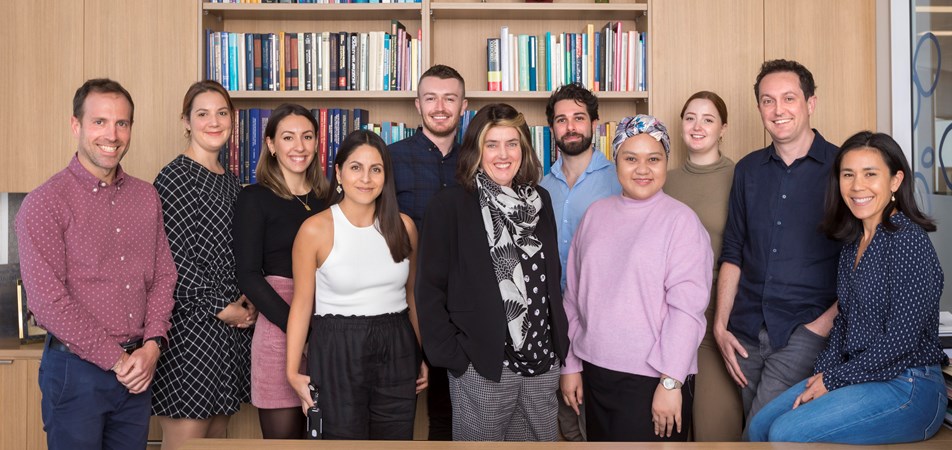To recover your password please fill in your email address
Please fill in below form to create an account with us

08/03/22
The theme for this year’s Kidney Health Day is “Bridge the Knowledge Gap to Better Kidney Care”. While early detection allows for disease care and management to help prevent morbidity and mortality, and improve cost effectiveness and sustainability, kidney disease related mortality continues to increase yearly and is projected to be the 5th leading cause of death by 2040.
To recognise this important day, we spoke with CTC’s Dr Brendan Smyth and Dr Jessica Dawson who share a passion for improving health outcomes for people with kidney disease.




Q: What inspired you to work in kidney health?
A: Brendan: Multiple factors played their part. Firstly, the physiology of the kidney is interesting. But what really swayed me was seeing the long-term relationships that nephrologists can develop with their patients and the teamwork that is involved in the care of people with kidney failure (dialysis nurses, nurse specialists, and allied health).
A: Jess: The importance of nutrition and lifestyle throughout all stages of chronic kidney disease really drew me in. I could see the impact I could have on a person’s health and the management of their kidney disease. Like Brendan, I also really enjoy the relationships we can build with our healthcare team and patients.
Q: Why is kidney disease related mortality on the rise and what can be done to reduce the numbers?
A: Brendan: Ultimately this reflects the rise of non-communicable diseases, in particular, hypertension and diabetes. These diseases cause kidney damage and ultimately kidney failure and are responsible for the majority of new cases of kidney disease worldwide.
Addressing the burden of kidney disease, therefore, involves promoting healthy lifestyles and environments, as well as discovering new treatments to preserve kidney function and reduce the high risk of cardiovascular disease in people with chronic kidney disease.
Q: Tell us a little about CTC’s kidney health research
A: Brendan: The CTC Kidney Health team has a number of projects in development that focus on chronic kidney disease. Two studies are currently in development, the TEXT STIMULI study aims to improve medication adherence in people with kidney disease, and the ARTWRK study aims to test novel treatments for chronic kidney disease.
We are also focused on people with kidney failure, especially those receiving dialysis therapy. The RESOLVE study is a pragmatic cluster randomised trial of two different salt (sodium) concentrations in dialysate (the fluid used to wash the blood during a dialysis treatment session). This study has recruited, over 10,000 participants from 150 sites in five countries and plans to expand to over 400 sites. We are excited to have ethics approval in South Africa and hope to be soon recruiting sites with our partner, National Renal Care.
When RESOLVE draws to a close (estimated to be late 2024) it will be the largest ever study in kidney disease and will leave a worldwide legacy of sites and collaborators with which to build future studies.
We are also addressing calciphylaxis, a rare but devastating condition affecting people with kidney failure. The BEAT-Calci study utilises a number of innovative design features including response adaptive randomisation within its platform design. This study commenced recruitment last year.
Finally, my particular interest is symptom management. People with kidney failure suffer a range of symptoms such as pain, itch, nausea, restless legs, and fatigue. We have designed a trial of cannabis oil in people with kidney failure, with a view to working out if this will be a promising treatment for future studies.
A: Jess: The kidney health team has just received some initial funding to develop digital nutrition interventions. Nutrition is a complex area that can be overwhelming for patients to understand and self-manage. Digital technologies show promise at improving patient engagement and healthy behaviours, however, have largely not been evaluated in chronic kidney disease. We will be designing a novel intervention using CTCs expertise in adaptive trial designs to evaluate the impact of digital technologies to improve dietary behaviours in chronic kidney disease and associated conditions.
Q: How can we bridge the gap to better kidney care? What are your hopes for the future?
Brendan: I hope to see better coordination between different kidney care providers, that is hospitals, health care networks, the kidney failure registry, and consumers. This should help to support research by providing pathways for data sharing and collaboration.
With less burden on participants and clinical staff, it will be easier to recruit people into studies and so deliver studies examining the long-term outcomes, survival, hospitalisation, cardiovascular disease, and quality of life, that matter most.
About Dr Brendan Smyth
Brendan is a Postdoctoral Fellow at the NHMRC Clinical Trials Centre at the University of Sydney. He completed his PhD in 2021, focusing on randomised controlled trials and methodology in patients receiving dialysis. He is also a Staff Specialist Nephrologist at St George Hospital and honorary fellow at The George Institute for Global Health.
Brendan's research experience includes clinical trial development, implementation, and analysis. He is a leading member of the International Society of Nephrology-Advancing Clinical Trials (ISN-ACT) group, and in addition to journal publications, has also contributed textbook chapters, and designed and delivered nephrology teaching.
In 2022, Brendan was awarded the RACP Jacquout Fellowship and was accepted into the International Society of Nephrology Emerging Leaders Program.
About Dr Jessica Dawson
Jess is a Research Fellow in the Kidney Health team at the NHRMC CTC at the University of Sydney. She is a renal dietitian with over 10 years’ clinical experience across Australia and the UK. Jess was awarded her PhD in 2021 that evaluated the impact of eHealth interventions to improve dietary care for people with chronic kidney disease. She was a finalist for the 2020 Young Investigator Award with the Australia and New Zealand Society of Nephrology. Her goal is to combine her clinical practice with innovative, translational research in dietary and lifestyle management to improve care and outcomes in people with chronic diseases.
In 2022, Jess was awarded funding under the CTC Innovation in Trials Program for her evaluation of digital nutrition interventions to improve cardiovascular risk in people with chronic kidney disease.
Story by Sarah Munro, Communications Officer (NHMRC Clinical Trials Centre, University of Sydney) sarah.munro@sydney.edu.au